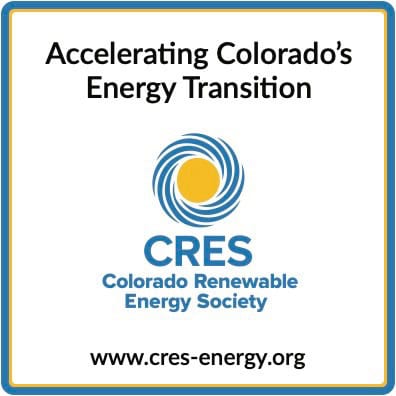Eric Blank says he hears county’s complaints but warns about trying to keep coal plants operating in violation of 2022 agreement. Was he out of line in where he responded? Environmental groups think so.
by Allen Best
The race is on to get new electrical generation for Xcel Energy and its customers launched by July 2026. The Colorado Public Utilities Commission on Sept. 4 approved a process for generation procurement that shortened the time from at least 360 days down to 154 days. That’s a shortened window of nearly seven months.
By February, Xcel should be able to move ahead to get work on the ground underway by July in order to qualify for federal tax credits.
“Normally, this is a very long, very detailed process to acquire resources like this,” said Commissioner Megan Gilman. “But I do think, given the situation, that this is a reasonable way to proceed.”
Meanwhile, controversy continues about how much new generation Pueblo will get and whether Eric Blank, the chair of the PUC, inappropriately responded to complaints made by Pueblo County in an unrelated docket.
Pueblo County, in a late-August filing in the near-term procurement proceeding, lashed out at the PUC, accusing it of listening only to the environmental community.
County commissioners, represented in this case by Frances Koncilja, a former PUC commissioner, vowed to seek federal intervention to keep the two remaining units at Comanche Generating Station open and operating at levels higher than planned.
One of the three Pueblo County commissioners, at a separate Sept. 4 meeting, reported seeking congressional support for the same. See: “Pueblo County refuses to repudiate plea to Trump.”
That same day, Eric Blank, the chair of the PUC, said he agreed that Pueblo should benefit from new generation that comes after the coal plants close. The last coal combustion at Comanche 3 is currently scheduled for late 2030. He said the written decision expected in the next several weeks will make clearer how the commission is promoting that goal.
But Blank also issued a warning. He said that if Pueblo County follows through on its vow to seek outside intervention that it could forsake the terms of an agreement struck in 2022.
That agreement promises Pueblo County $162 million in community assistance payments from Xcel. It also promised that new projects proposed for Pueblo County would benefit from a preferential price evaluation. In other words, they could produce electricity for $2 per megawatt hour more than projects located elsewhere but be given the same ranking.
Finally, the PUC approved a $100 million fund for a carbon-free future development concept that aims to provide initial financial support for new resources such as advanced nuclear and geothermal, said Blank. The PUC has now agreed to add a representative from Pueblo as a voting member of the advisory board.
“If the county were to withdraw from the settlement agreement, including its support for the capacity restriction on unit three, I just say that may have far-reaching impacts, including potentially on presumptions of prudence, the need for new resources, the availability of transmission capacity, the company’s Safe Harbor qualification, and the projected $162 million in community assistance payments that the settlement agreement contemplates,” he said.
The existing transmission capacity from Pueblo created for the Comanche units could provide a “significant advantage for projects that seek to locate (near Pueblo), he said.
Blank went on to say he hopes “we can pull this back together” as he believes the gap “may not be that large” given what the PUC has already approved and what it can offer as the just transition solicitation process moves toward completion.
In his remarks, Blank also indicated a willingness to review his positions and votes in light of Pueblo’s arguments and the materials it had refenced. That includes a report from January 2023 that proclaimed nuclear the preferred replacement for Comanche and a natural gas plant coupled with carbon capture as a distant second.
Blank said that in subsequent processes in the just transition solicitation docket that he intended to “take another look at my prior vote to partially reduce the just transition solicitation credits for resources located in communities with retiring coal plants, which seems to be one of the main issues raised in the county response.”
Pueblo County’s blast at the PUC commissioners was filed in response to the request by Xcel Energy and two state agencies to adopt an expedited process for procuring additional electrical resources. Federal tax credits will phase out beginning in July 2026, and to qualify for reduced costs the projects must be under construction by then. Trade groups broadly supported Xcel and the agencies’ request.
Readers unfamiliar with all the arcane elements of Colorado’s PUC process might well be confused at this point. Pueblo County’s filing was unusual in that a different docket — about the near-term procurement — to make an argument about the docket just transition solicitation. They’re related but legally distinct, at least as per the PUC procedures.
Megan Gilman, the other commissioner at the meeting, declined to comment at length, The time for reconsideration of the just transition solicitation decisions will be in the triple R process in that proceeding. Triple R is the rehearing, reconsideration and reargument process that is triggered by filings that must occur within 20 days after a written decision is issued. The written decision in this case has not been issued.
Was Blank out of line in using that forum about the near-term procurement for addressing Pueblo County’s statements?
A variety of environmental groups, in a filing on Sept. 12, objected to Blank’s statements. They raise “serious procedural and substantive issues and could lead to “further controversy and litigation in this case over procedural improprieties.”
The filing by the Sierra Club, the Natural Resources Defense Council, and several other groups further warned that this “problematic precedent” could “incentivize parties to make similarly baseless and extreme claims in the future to get the Commission’s attention when they are displeased with the Commission’s oral deliberations and decision.”
As for Xcel’s hurried procurement of new generating resources, the stage for the request was set by Colorado Gov. Jared Polis in a letter he made public on Aug. 1.
“We must provide confidence to the clean energy industry that Colorado is open for business as tariffs, shifting federal rules, supply chain crunches, and market uncertainty risk delaying investment in these affordable domestic energy resources,” Polis wrote. “In addition, we have a time-limited window for procurement of tax-advantaged wind and solar.”
Polis went on to say that Colorado was committing to eliminate administrative barriers and bottlenecks for renewables projects, including those eligible for the federal energy tax credits.
“By maximizing the utilization of tax credits while they’re available and reducing future tariff uncertainty, the State can avoid billions of dollars in additional energy costs for decades to come,” he added.
In the late-August filing, Xcel and its allies asked for permission for Xcel to move forward to acquire up to 4,000 megawatts of new renewable energy projects, 200 megawatts of thermal generation (likely natural gas), and an additional 300 megawatts of other firm dispatchable generation, which could be either storage or other thermal resources.
Xcel says it needs the gas because of concerns about resource adequacy.
Blank called it a thoughtful approach.
The plan allows Holy Cross Energy — the owner of 8% of Comanche 3 — to acquire projects identified in this process.
- Can these coal-fired units be relied upon for power? - October 7, 2025
- A simple Colorado River story: use less water - October 2, 2025
- Holy Cross Energy on track to achieve its 2025 goal - October 1, 2025







I’m actually sort of speechless. Pueblo can just wait its turn right now. The solar and wind projects need help now.
I’m not sure who, if anyone is at fault for the lack of a clear “just transition” in Pueblo. There are some who will never be happy with a transition from thermal power plants, and it probably won’t seem “just” to long-term steamfitters, even if some turbines get built there.